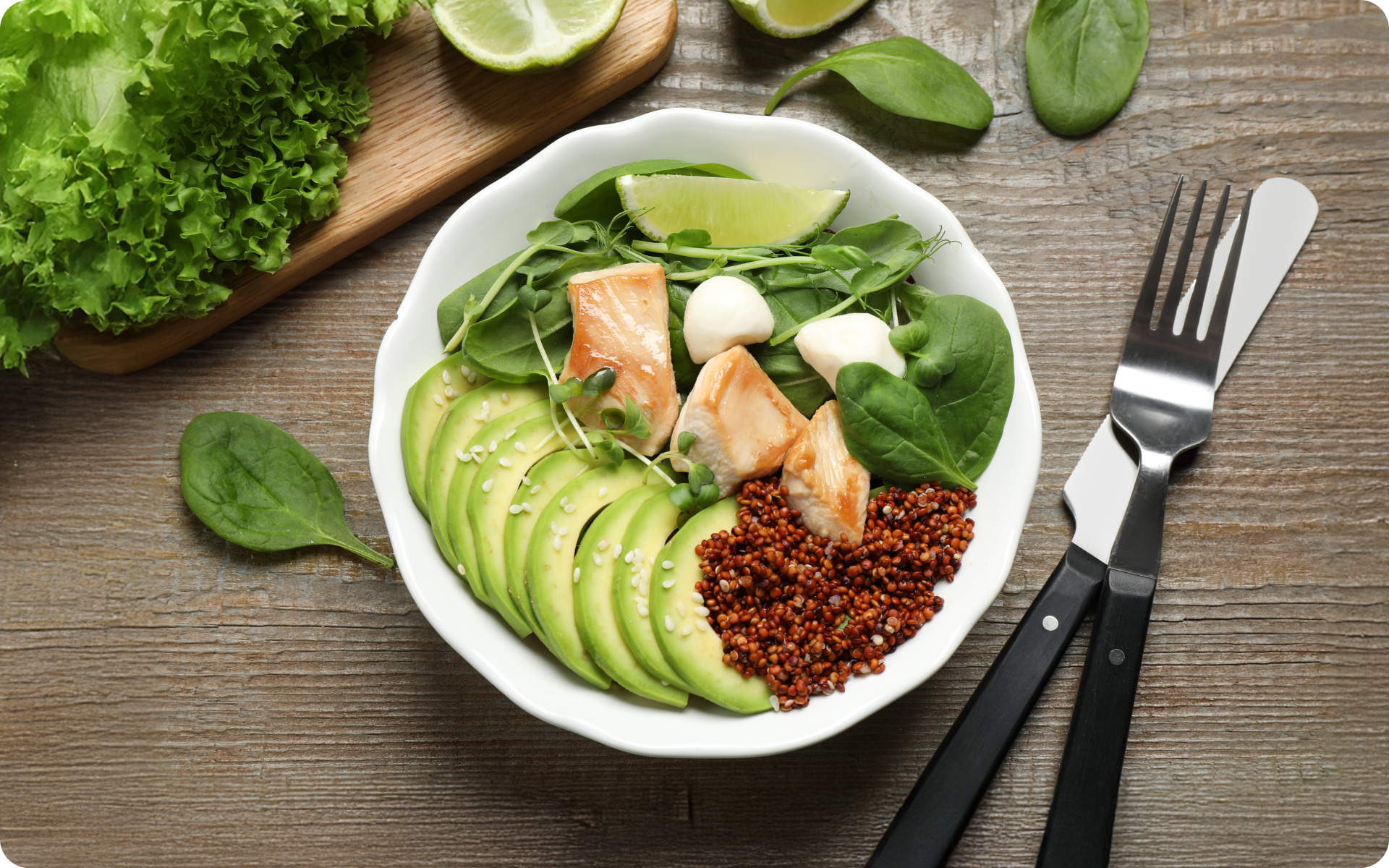Many diets are popular due to their fast weight loss results, but they often lead to specific health problems. Today, you’re about to learn about a sample of an animal-based diet meal plan and whether it’s worth using for weight reduction.
A carnivore diet is a specialized eating plan in which a person consumes only meat, eliminating all plant-based products, including vegetables, fruits, grains, nuts, seeds, and legumes. If you’ve ever considered trying this diet, it’s essential to learn about both its potential benefits and risks.
Additionally, consulting with your healthcare provider is the best course of action at this point, as this diet may not be suitable for everyone.
This review will help you figure out a few answers to the main questions:
- Can you lose weight on the carnivore diet?
- What to eat and not to eat on this diet plan?
- What are the drawbacks of eating only meat?
Can I Lose Weight On An Animal-Based Diet?
The carnivore diet excludes all veggies, fruits, and other plant-based products from your meals. You only consume meat products and may be expected to lose weight.
Why might it be possible?
First of all, cutting out carbs will allow you to enter a state of ketosis, where your body burns fat for energy. This ketosis state might lead to weight loss, but it also requires a reduction in calorie intake. Additionally, high-protein and high-fat diets can help you feel satiated for longer, which reduces the potential for excessive calorie intake.
However, the efficacy of an animal-based diet on weight loss is controversial.
On the one hand, a limited study suggests that a carnivore diet combined with calorie restriction could lead to reduced fat mass and body weight, a characteristic of most calorie-restricted diets (1).
On the other hand, there is no consistent scientific evidence demonstrating the efficacy of an animal-based diet on weight in the long term, and its potential effects on cholesterol levels and risk of heart attack and stroke are concerning (2).
Aside from this, sticking to a carnivore diet will not be possible for long; it’s a restrictive eating routine that excludes many beneficial foods necessary for health and wellness.
To sum up, even if you lose weight on the animal-based diet, this efficacy would not last long, and on top of it, you could end up with other health consequences that are often associated with this diet. But more about the risks later.
Read more: Healthy Fitness Meals to Fuel Your Workout Every Day
What Do You Eat In An Animal-Based Diet?
Animal-based diet food lists are simple to navigate; there are no fancy foods you must include in your diet. On the contrary, you will need to eliminate all plant-based products.
Check out the carnivore diet food list to see whether you would try it:
- Meat: You’re allowed to consume chicken, beef, turkey, lamb, pork, bacon, etc.
- Organ meats: Other organs are also okay on this diet, like liver, brain, kidney, tripe, and heart.
- Fish: Salmon, crab, mackerel, sardines, lobster, tilapia, herring, etc.
- Other products made of or by animals: eggs, bone marrow, lard, bone broth, etc.
- Low-lactose dairy (in small amounts): heavy cream, butter, hard cheese, etc.
- Water (plain or sparkling).
BetterMe: Health Coaching app helps you achieve your body goals with ease and efficiency by helping to choose proper meal plans and effective workouts. Start using our app and you will see good results in a short time.
To prepare your food, people on this diet use butter, ghee, and tallow.
Some spices are also allowed: salt, pepper, paprika, cumin, and garlic (3).
As you can see, the foods you can enjoy on the carnivore diet are narrow and restrictive. On the bright side, ultra-processed and sugary products are also not allowed, which would be a positive aspect were it not for the nutritional insufficiency and health risks associated with the diet.
How To Make An Animal-Based Diet Meal Plan Balanced?
Let’s face it, handling the carnivore diet meal plan is not an easy task.
With so many restrictions, you might either overeat the same food every day or simply give up on the diet. Since it excludes carbohydrates, fiber, and most healthy fats, it is impossible to make this diet truly balanced.
Yet, if you decide to start a 7-day animal-based diet meal plan or even extend it for longer, you can try to incorporate as many different meats as possible into your dishes.
Examine this step-by-step instruction to make this diet more bearable and versatile:
- Eat more protein and fat: Include a variety of different meats in your diet, rather than focusing solely on chicken, for instance. This variety of food groups will add some diversity to your eating routine. Add as many fatty foods as you can, which will provide an alternative source of energy in the absence of carbohydrates. Excellent examples include fatty fish, such as salmon or tuna, or cuts like pork belly or ribeye.
- Consume dairy and eggs as well: Eggs and dairy are excellent sources of protein and other nutrients.
- Stay hydrated: You need to drink more because on the carnivore diet, you’ll eat less fiber, which might negatively impact your digestion.
Prepare bone broth that benefits your joint health, and drink more plain or sparkling, unsweetened water. Sometimes, dehydration can be confused with hunger. Before eating, try having a glass of water to see if you’re truly hungry.
- Choose nutrient-dense meals: Most meats, eggs, seafood, and dairy products are rich in nutrients, including vitamins and Omega-3 fatty acids. The more versatile your choices are, the more nutrients you get, although there are still many you won’t be able to get without plant-based foods.
- Eat enough without starving: Eat just enough to feel satisfied, but don’t overeat so that you can barely move your body.
What Is Not Allowed In An Animal-Based Diet?
If you aspire to reap the benefits of all meat dieting, you need to exclude specific foods that don’t align with the diet’s philosophy. The list below contains all foods you should avoid or eliminate from your meals during an animal-based diet.
All the plant-based foods should be off the table: No fruits, veggies, grains, legumes, nuts, and seeds (3).
An animal-based diet with fruit can’t exist according to carnivore rules.
Moreover, you’re not allowed to eat:
- Processed foods: Highly processed foods tend to contain added sugars, unhealthy fats, and various preservatives and stabilizers.
- Plant-based oils: Canola oil and olive oil should not be used in your meals or during preparation, as they are not animal-based
- Sweeteners and sugars: Honey, maple syrup, candies, chocolates, pastry, and other sugary products are frowned upon.
What Are The Disadvantages Of Animal-Based Diet?
Surely, proponents of an animal-based diet may claim that it has benefits in the short term, but in the long term, it leads to health consequences that can be difficult to manage.
The main disadvantage of the carnivore diet is the lack of essential nutrients.
By eliminating fruits and vegetables, people may not get enough fiber in their diets, which can affect their gut health and lead to constipation (4).
Another pitfall comes from the lack of carotenoids and polyphenols, main substances with antioxidant properties that lower your risk of Type 2 Diabetes and some types of cancer (4), not to mention the high intakes of saturated fat, which may increase your risk for cardiovascular disease.
Another thing to keep in mind is that the increase in industrial production of animal-based foods could be harmful to our Planet, which accelerates climate change (4).
Last but not least, most health professionals would not advise anyone to follow an animal-based diet long-term; it’s far too restrictive, pushing you to eliminate delicious foods such as vegetables, whole grains, fruits, and legumes.
Humans need to eat carbs and fiber to stay healthy and energetic. The shortage of specific vitamins and minerals, like potassium, fiber, vitamin C, and others, can reflect on your body after some time.
Therefore, if you wish to try this diet, it’s best to consult a registered dietitian or your healthcare provider. These professionals can recommend a dietary pattern tailored to your personal needs and current health condition.
Read more: Clean Eating Challenge: A Simple Guide To Kickstart Your Journey
Why Am I Not Losing Weight On Animal-Based Diets?
Many reasons can hinder your weight loss process. Additionally, losing weight is not possible without balancing your overall lifestyle. So, let’s take a look at them closely.
Reason #1: This Diet May Not Be A Good Fit
The carnivore diet is not for everyone, and that’s a fact. While some people can lose weight (short-term) by eating only meat in adequate amounts, others may not.
All bodies are different and consequently react differently to dietary choices.
Reason #2: You’re In A Calorie Surplus
Even on an animal-based diet, a calorie surplus is possible.
Not tracking your calories and having no calorie deficit may stall the weight loss process. Plus, overeating animal products is easier compared to plant-based foods, since they can be calorie-dense.
The BetterMe: Health Coaching app will provide you with a host of fat-frying fitness routines that’ll scare the extra pounds away and turn your body into a masterpiece! Get your life moving in the right direction with BetterMe!
Reason #3: You Eat Too Much Fat And Protein
Healthy fats and protein are essential to your body, but having them in excess can have the opposite effect. Eating too much fat and/or protein, for instance, may lead to excess weight because you’ll be eating more calories than your body requires (5).
Reason #4: Your Lifestyle Is Sedentary And Stressful
Not moving enough and being constantly stressed out are real buzz killers when, instead of engaging in the weight loss process, you end up with weight gain and a bad mood. You need to be physically active and develop effective ways to manage stress. For instance, long-term stress has a strong link to weight gain (6).
Unfortunately, everyone’s situation is different, and stress, combined with a sedentary lifestyle, can be challenging to manage. However, with professional help or support from loved ones, everything is possible.
Reason #5: Your Possible Underlying Health Conditions
People with certain health conditions, such as diabetes, hypothyroidism, or PCOS, could find it harder to lose weight. Furthermore, specific medications like insulin or antidepressants may also promote weight gain.
Reason #6: You’re Not Getting Enough Sleep
Poor sleep and weight gain are closely linked and have been extensively studied for years. A 2022 study found that sleep deprivation is linked to obesity, at least in part because it alters the metabolic rate (7).
Aside from this, people who don’t get enough sleep often feel hungrier and crave high-calorie foods.
What Is An Example Of An Animal-Based Diet Day Meal Plan?
Here is a good example of a one-day carnivore diet meal plan, as outlined by WebMD (3).
Breakfast: Scrambled Eggs with Turkey
Instructions:
- Cut a slice of turkey breast into small pieces and cook in a skillet until browned on both sides.
- Whisk 2-3 large eggs in a bowl with salt and pepper to taste (depending on how much you eat).
- Move the chopped turkey to one side of the skillet and pour the eggs onto the other side. Mix the eggs with the turkey until cooked through. Enjoy.
Approximate nutritional value:
Calories: 250 Kcal
Fats: 13 grams
Protein: 24 grams
Carbs: 1 gram
Lunch: Salmon Patties
Instructions:
- Cook three slices of turkey bacon and crumble.
- In the bowl, mix bacon, two cans of salmon, salt, and two whisked eggs.
- Add 1/2 teaspoon of dill. Form the mixture into burger-sized patties.
- Cook in butter until browned.
Approximate nutritional value:
Calories: 580Kcal
Fats: 37 grams
Protein: 65 grams
Carbs: 2 grams
Dinner: Carnivore Chicken Casserole
Instructions:
- Process 1 pound of cubed rotisserie chicken in a food processor.
- Add 8 ounces of cream cheese, 1 cup of shredded cheddar cheese, and 1 cup of sour cream. Process until thoroughly combined.
- Add 1 tablespoon of taco seasoning and mix again.
- Place the mixture in a baking dish and bake for approximately 45 minutes at 350°F (177 °C).
Approximate nutritional value per serving:
Calories: 550 Kcal
Fats: 45 grams
Protein: 35-40 grams
Carbs: 2 grams
Yes, you can have coffee on the carnivore diet. Despite its plant-based nature, many carnivore eaters still allow themselves a cup of black coffee. Yet, with the stricter, more traditional version of the diet, you might need to avoid or reduce the intake of it. No, eating bananas is prohibited on an animal-based diet. Bananas are a fruit, and they are not typically included in a carnivore diet. The best beverages you can drink on the carnivore diet are those containing no plant-based products. They are plain water and bone broth. People who do not have lactose intolerance may also enjoy milk. Greek yogurt is animal-based because it’s made from cow’s or goat’s milk, resulting in thicker, high-protein yogurt. That’s why it’s typically okay to consume it on an animal-based diet. Frequently Asked Questions
Can I drink coffee on a carnivore diet?
Can you eat bananas on an animal-based diet?
What to drink on an animal-based diet?
Is Greek yogurt animal-based?
The Bottom Line
A carnivore diet eliminates products except for meat and animal products. There are no long-term animal-based diet benefits, and the diet increases certain health risks, which is why talking to your healthcare provider is crucial before making this diet a part of your life.
Today, you’ve learned a sample of an animal-based diet meal plan, the foods that are allowed and prohibited during this eating regimen.
Although we don’t recommend it, if you still want to lose weight on the carnivore diet, consider promoting your lifestyle by eating a variety of different meats and animal products, exercising regularly, getting enough sleep, managing stress, and maintaining a calorie deficit.
DISCLAIMER:
This article is intended for general informational purposes only and does not serve to address individual circumstances. It is not a substitute for professional advice or help and should not be relied on for making any kind of decision-making. Any action taken as a direct or indirect result of the information in this article is entirely at your own risk and is your sole responsibility.
BetterMe, its content staff, and its medical advisors accept no responsibility for inaccuracies, errors, misstatements, inconsistencies, or omissions and specifically disclaim any liability, loss or risk, personal, professional or otherwise, which may be incurred as a consequence, directly or indirectly, of the use and/or application of any content.
You should always seek the advice of your physician or other qualified health provider with any questions you may have regarding a medical condition or your specific situation. Never disregard professional medical advice or delay seeking it because of BetterMe content. If you suspect or think you may have a medical emergency, call your doctor.
SOURCES:
- The Effect of the Carnivore Diet Under Calorie Restriction on Body Composition Changes in Athletes: A Systematic Meta-Analysis (2024, researchgate.net)
- The carnivore diet: why it’s not good for your health (2025, www.bhf.org.uk)
- Carnivore Diet: Meal Plan, Food List, and What You Should Know (2024, www.webmd.com)
- Carnivore diet a ‘terrible idea’ (2024, hsph.harvard.edu)
- Protein Power Play or Nay — 5 Reasons Eating Too Much Protein Could Be a Bad Idea (2024, livehealthy.muhealth.org)
- You Guessed It: Long-Term Stress Can Make You Gain Weight (2023, health.clevelandclinic.org)
- Sleep Deprivation: Effects on Weight Loss and Weight Loss Maintenance (2022, pmc.ncbi.nlm.nih.gov)















